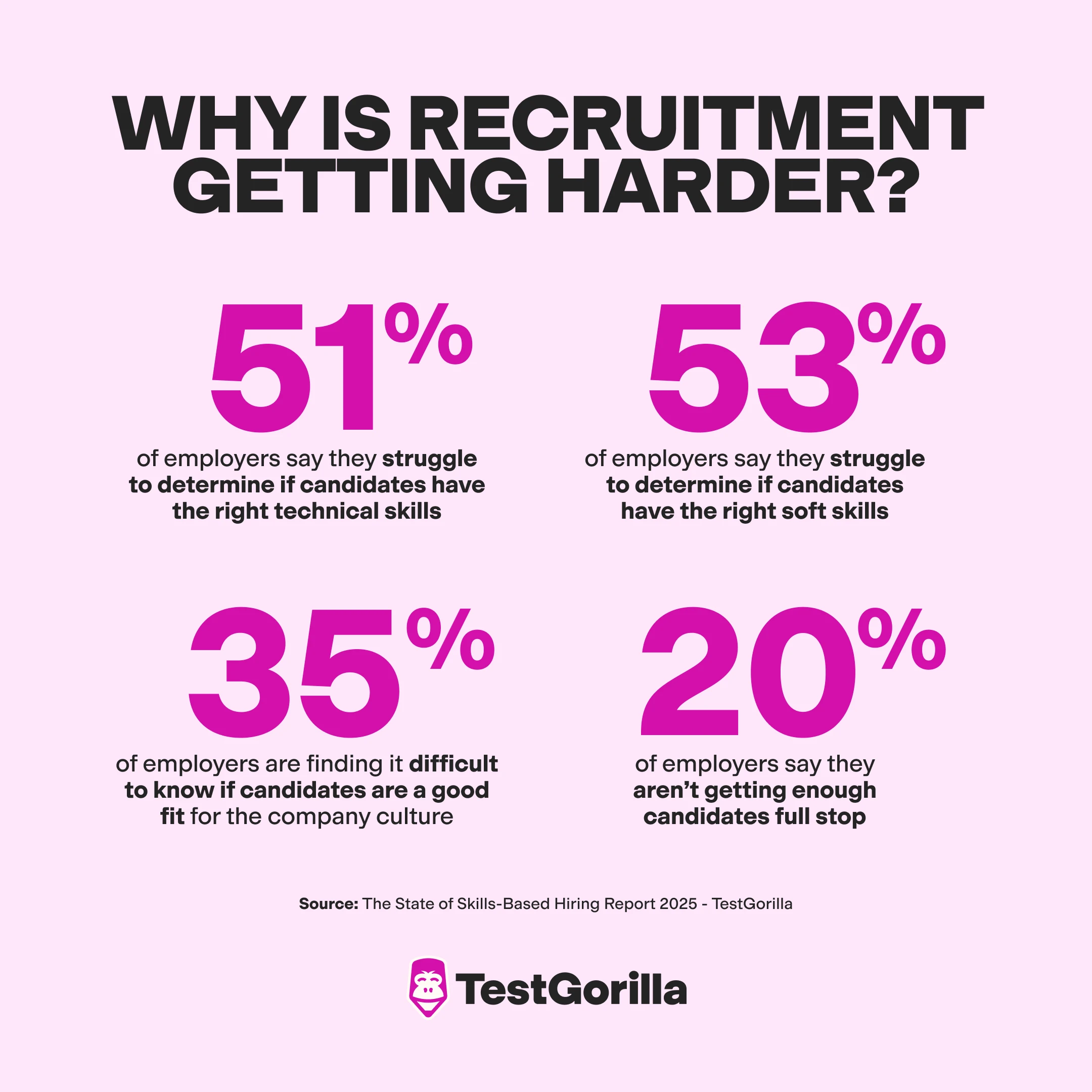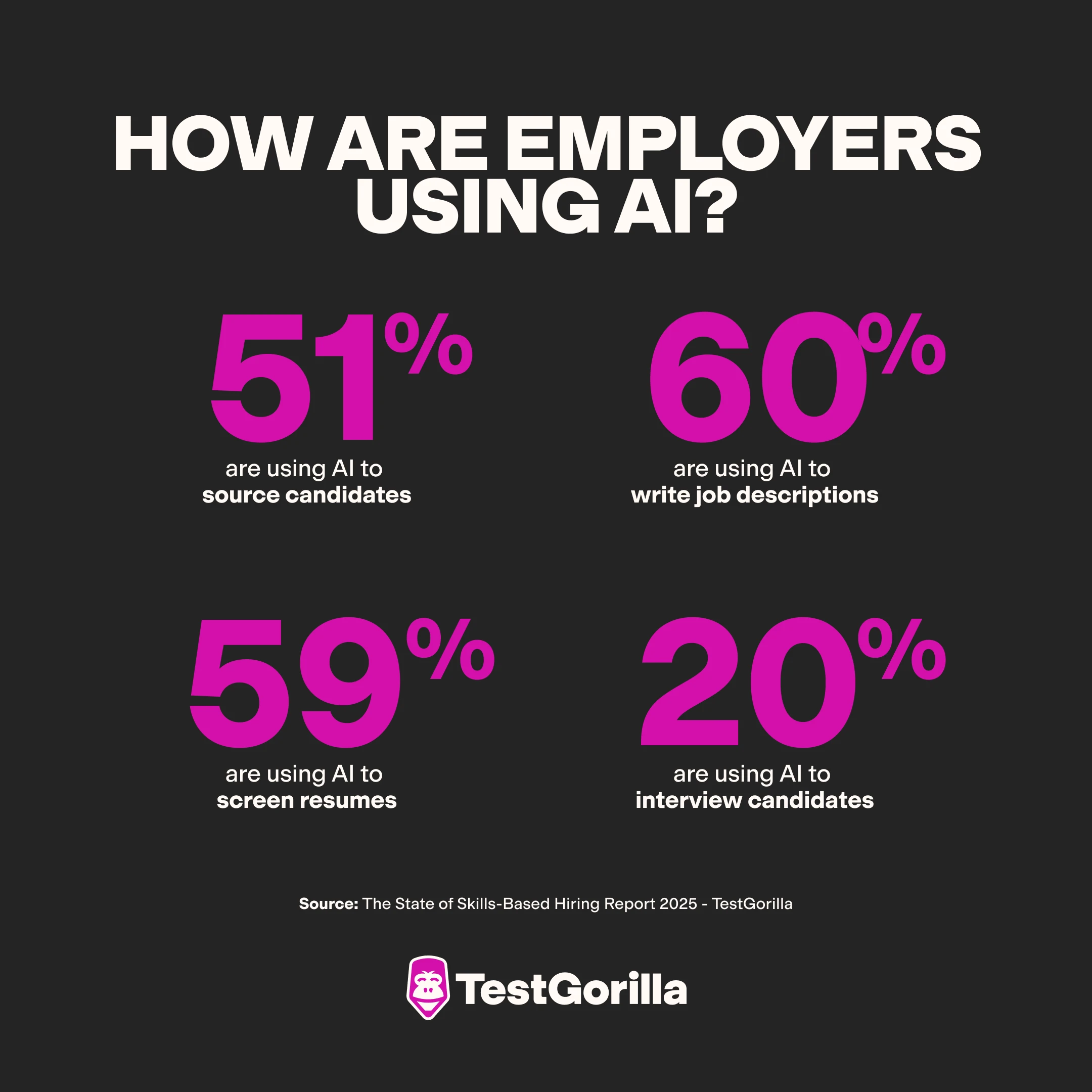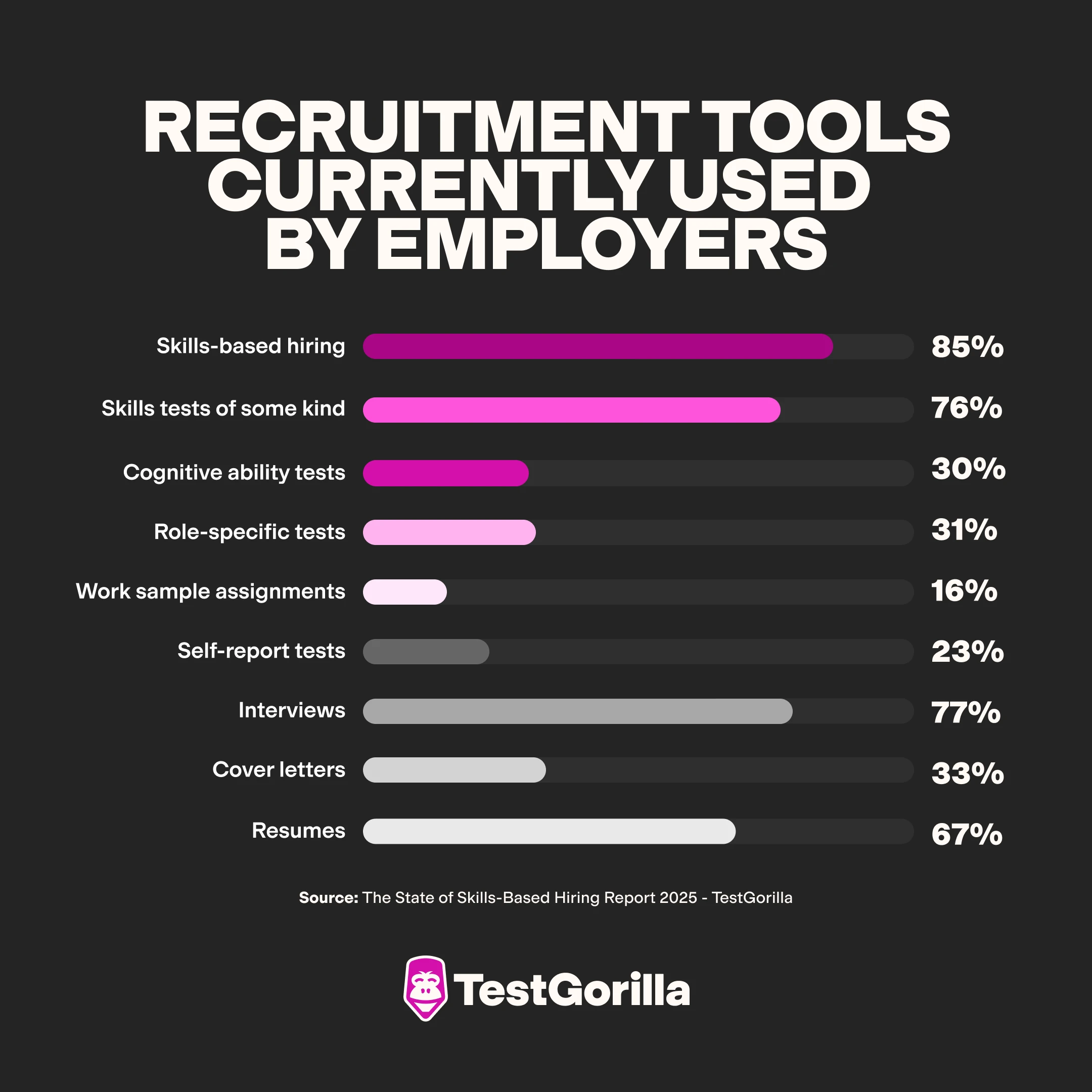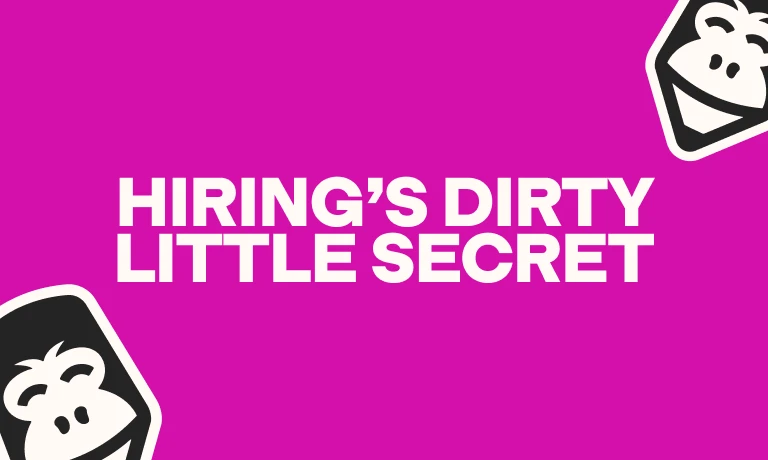We surveyed over 2,000 employers and job seekers across the US and the UK to bring you The State of Skills-Based Hiring 2025. Here you can find a quick compilation of all the recruitment statistics from the report, categorized by topic. Let’s dive right in.
Our data shows recruitment is getting harder
Across the board, a majority of candidates and employers are saying recruitment is getting harder.
63% of employers say it’s getting harder to find talent
71% of job seekers say it’s getting harder to find a job
This goes up to three quarters for Gen Z
89% of UK and 86% of US employers are having problems with resumes
This is happening for a myriad of reasons, which are explored in the report. To give you an idea:
Over half of employers (51%) say they struggle to determine if candidates have the right technical skills
53% say the same about soft skills
35% are finding it difficult to know if candidates are a good fit for the company culture
1 in 5 say they aren’t getting enough candidates full stop
On top of this, a concerning recruitment trend stands out in the job seeker data:
Hiring bias is rising
Here’s what job seekers told us:
42% have experienced hiring bias this year
This is up from 31% in 2024 and 21% in 2023
3 in 5 (59%) of job seekers have trouble standing out with their resume
54% say they’ve been overlooked because of a lack of experience or qualifications
Despite this, 79% of UK and US employers say having a more diverse team is important to their company, and 84% say building an inclusive culture is important. There’s a disconnect somewhere – and it’s more important now than ever for employers to follow through on their commitments to inclusive hiring.
AI is now commonly used for recruitment
Next up: How many employers are using AI for recruitment – and how are they using it?
51% employers are using AI to source candidates
6 in 10 are using AI to write job descriptions
59% are using AI to screen resumes
2 in 10 are using AI to interview candidates
73% say they’ve noticed a rise in AI-generated resumes
7 in 10 say they’re easy to spot
37% of job seekers are using AI to complete applications
AI usage is soaring and it’s here to stay. It’s bringing results, too.
Employers say AI is improving the recruitment processes
94% of employers who are using AI in recruitment told us it’s bringing improvements. Here’s a breakdown of the impact AI is having:
47% say AI has improved their hiring process significantly
47% say AI has improved their hiring process slightly
5% say AI hasn’t really improved their hiring process
>0.5% say AI has made their hiring process worse
Want more stats about AI in general? Head to this blog
The best insights on HR and recruitment, delivered to your inbox.
Biweekly updates. No spam. Unsubscribe any time.
Which recruitment tools are employers using?
Whilst AI tools are all the rage, there’s plenty of other tech and tooling to use for recruitment. We asked employers which tools they’re using, and this is what they told us:
85% of companies are using skills-based hiring in 2025
This is compared to 81% in 2024 and 73% in 2023
59% of those employers started using skills-based hiring in the last two years.
76% are using skills tests of some kind
30% are using cognitive ability tests
31% are using role-specific tests
16% are using work sample assignments
23% are using self-report tests
77% are using interviews
33% are using cover letters
67% are using resumes
Resumes a recruitment pain point in 2025
In 2025, resumes still stand out as a core pain point for recruiters. 2 in 3 are still using them, and most of them are having problems:
1 in 3 can’t tell from a resume if an applicant has the skills they need
2 in 5 (39%) find it hard to rank candidates using resumes
36% say they don’t know when a resume is accurate
1 in 4 recieve too many resumes to read
27% say applicants’ resumes are too similar
But it goes beyond that. We asked US and UK employers: What’s the most difficult part of their recruitment process today?
Here’s a breakdown of their answers.
| Filtering candidates by resume/CV | Determining if candidates have the right technical skills for the role | Determining if candidates have the right soft or human skills for the role | Determining if candidates are aligned with company culture | Getting enough candidates |
US | 39% | 55% | 55% | 38% | 23% |
UK | 51% | 48% | 51% | 32% | 17% |
Degree requirements are still being contested
Alongside resumes, degree requirements have been a hotly contested recruitment topic this year. Where do employers stand?
Over half (53%) of employers have eliminated degree requirements
This is a 77% increase from last year when only 30% had removed them
Despite this, 41% say it’s more important to have a degree than it was five years ago
32% think it’s less important than it was five years ago
US employers are more likely to remove degree requirements
Skills tests becoming increasingly popular
With 3 in 4 (76%) companies using skills tests, they’re becoming a mainstay in modern recruitment. Here’s a breakdown of the skills tests being used:
69% are using soft skills tests
50% are using cognitive ability tests
35% are using self report tests
33% are using multi-measure testing
28% are using language tests
Increasing skills test usage is bringing results, and it’s set to continue – 96% say their budget for skills evaluation will either increase or stay the same in the next 12 monts. As for the benefits:
71% say skills tests are more predictive of job success than resumes
65% say employees hired using skills tests stay in their roles longer
3 in 5 reduced their time-to-hire by incorporating skills tests
2 in 3 reduced their mis-hires by using skills tests
When does recruitment go wrong?
Our stats show that recruitment goes wrong when employers don’t understand enough about their candidates to truly know whether they’re a good match or not. A good match isn’t dictated by skills and experience alone; it’s also to do with making sure a candidate’s motivations and expectations for growth are aligned with the employer’s.
In fewer words: Our stats show recruitment goes wrong when a hiring process isn’t holistic enough. Here’s the data.
78% of employers have hired a candidate with strong technical skills who did not perform well due to a lack of soft skills or poor cultural fit. When we asked about the consequences of this mis-match:
41% said it decreased team productivity
42% said it increased employee turnover
38% said it had a negative impact on company culture
44% said it caused challenges with collaboration or communication
Half of candidates say they’ve been a mis-hire
52% of job seekers say they’ve been on the other side – they’ve had strong technical skills for a job but haven’t been successful because of a lack of soft skills or a poor cultural alignment. This is more common in the UK (56%) than the US (49%).
When we asked this cohort about the consequences of being the mis-hire:
32% said they found it difficult to work with the team
54% said they felt unhappy or unfulfilled on the job
2 in 5 said they struggled to communicate effectively
1 in 4 left the job entirely
Context-rich recruitment leads to better outcomes
So what do the stats tell us about how to stop recruitment from going on? It’s fairly simple. The majority agree that context-rich recruitment leads to better hiring outcomes.
72% of employers and 82% of job seekers agree it's better for companies to consider the whole person – including their skills, personality, and cultural alignment – rather than just their technical skills or experience.
When we asked employers about the benefits of hiring for a combination of technical skills, soft skills, motivation and cultural alignment:
6 in 10 said it leads to improved team performance
1 in 2 said it leads to increased retention
58% said it improves team cohesion
43% said it fosters a better company culture
43% said it improves collaboration and communication
Recommended reading: How to measure motivation
Head to the report for more recruitment insights
Thanks for reading. For more stats about recruitment, skills and beyond, head to our 2025 report.
You've scrolled this far
Why not try TestGorilla for free, and see what happens when you put skills first.





















